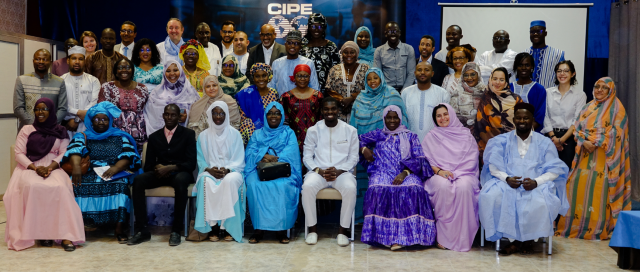Sahel Conference Report: Promoting a Private-Public Dialogue for Development, Security and the Fight against Violent Extremism in the G5 Sahel
In late 2022, the Center for International Private Enterprise (CIPE) organized a regional conference on promoting a public-private dialogue in the Sahel to fight the root causes of insecurity and to promote economic development. This event was organized in collaboration with the G5 Sahel Executive Secretariat and took place in Nouakchott, Mauritania. This report (available in French) contains a summary of key actions identified and commitments for the coming year.
Constructive dialogue between the public and private sectors is crucial to advancing economic growth and development across Africa. The private sector promotes economic development by supporting job creation, strengthening value chains, and facilitating strategic investments in infrastructure and public services. At the same time, the private sector engages in advocacy that supports market development and advances economic reforms that improve the business environment and attract private capital. Dialogue between the public and private sectors around opportunities for collaboration and regulatory reform can create a virtuous cycle that accelerates economic growth and democratic development.
Following a 2018 request from senior public and private sector representatives of the G5 Sahel (Burkina Faso, Chad, Mali, Mauritania, and Niger), CIPE initiated a program to elevate the voices of local businesses in regional security and economic policy conversations, launched the Sahel Business Coalition, and established a formal partnership with the G5 Sahel Executive Secretariat. This partnership seeks to deepen opportunities for public-private dialogue to inform the peace and development agenda of the G5 Sahel. As the program closed its second phase in 2022, CIPE and the G5 Sahel organized the regional conference to assess the current economic development initiatives in the region and opportunities for the private sector to contribute to the regional development agenda. The outcomes and recommendations from the conference are outlined in this report and build upon the work of the Sahel Business Coalition. The report includes the following recommendations to strengthen public-private collaboration in the Sahel:
- Establish a strategic framework for public-private dialogue that facilitates the inclusion of private sector perspectives in regional economic and development policies, and is informed by existing public-private dialogue mechanisms in each of the G5 Sahel countries;
- Ensure the participation and representation of women, youth, and the informal sector in regional public-private dialogue processes, with a specific emphasis on:
- Finding mechanisms to integrate associations that represent the informal sector, particularly for sectors such as agriculture, craftmanship, fishing etc.;
- Supporting the participation of women’s business organizations and cooperatives working on women’s economic empowerment, particularly in rural areas;
- Promoting the participation of young entrepreneurs and youth-serving associations.

The forum also created a space for the Sahelian private sector representatives to share their perspectives on how to strengthen regional cooperation to support impactful investments and programming in the Sahel:
- Reinforce the importance of civil society’s participation in governance and public financial management. Civil society must be a credible and valued counterpart for governments. In order to strengthen contributions from civil society representatives, there is a need to ensure that organizations representing women and youth are included in the development and implementation of reforms – particularly around education and private sector development. It is also important to ensure that civil society’s role in holding the public sector accountable is acknowledged and understood by the public sector.
- Ensure that international aid investments in the Sahel are transparent and responsive to local demand; specifically:
- Increase opportunities for co-creation that allow the private sector and civil society groups to inform international aid investments and reduce the duplication of efforts;
- Support greater transparency in both the international aid investment process and in the spending and commitments of beneficiary states once aid is received;
- Facilitate south-south learning opportunities between the G5 Sahel states and other regions, e.g., Asia, to share success stories from development programs in conflict-affected countries.
The conference concluded with a recommitment of the G5 Sahel Executive Secretariat to support dialogue to support economic development and resilience, with Mr. Amadou Sall, Head of the Gender, Youth and Fight against Violent Extremism Division of the G5 Sahel Executive Secretariat saying, “We are open to any initiative aiming at reaching the strategic objectives of the G5 Sahel in the fields of peace and development. Our institution made the choice of inclusiveness of all the stakeholders; hence dialogue is a natural phase, particularly around the questions of economic development, entrepreneurship, employment, and resilience.” CIPE will continue to support the Sahel Business Coalition to implement and share these recommendations throughout the program.
Published Date: March 21, 2023
